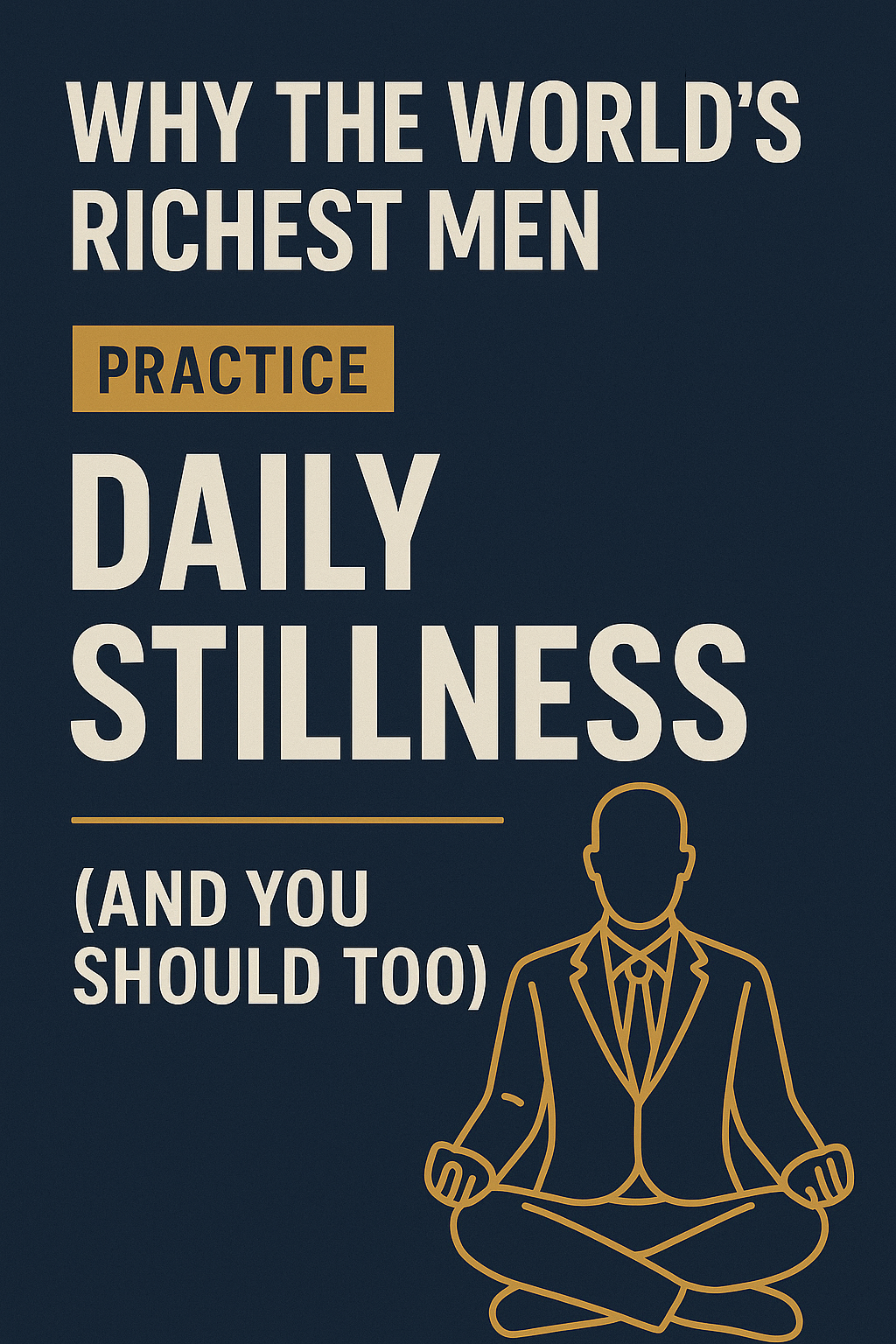Why the World’s Richest Men Practice Daily Stillness (And You Should Too)
It’s fascinating, isn’t it? In a world that glorifies constant motion and packed schedules, some of the most influential and successful people on the planet are deliberately carving out time for… well, nothing. They practice stillness. And it’s not just a trend; it’s a strategic weapon for unparalleled clarity and performance.
In an age of relentless notifications and the pressure to always be “on,” true stillness seems counter-intuitive. Yet, from legendary investors to tech visionaries, many of the world’s wealthiest individuals attribute a significant portion of their success to a consistent practice of quiet reflection, contemplation, or meditation. This isn’t about escaping reality; it’s about mastering it.
What Does “Stillness” Really Mean?
Stillness isn’t necessarily sitting cross-legged chanting “Om.” For these high-achievers, it can mean:
- Mindful Moments: A few minutes of deep breathing before checking email.
- Contemplative Walks: A solitary stroll without a phone, simply observing.
- Scheduled Reflection: Blocking out time in the calendar just to think, read, or stare out a window.
- Meditation: Formal practice, often Transcendental Meditation (TM) or Vipassana.
The common thread? Deliberately disconnecting from external noise to connect with internal wisdom.
The Brain Science Behind the Billion-Dollar Benefit
This isn’t woo-woo; it’s hard science:
- Reduced Stress & Cortisol: Stillness activates the parasympathetic nervous system (our “rest and digest” mode), significantly lowering the stress hormone cortisol. Studies have shown even short periods of silence can reduce heart rate and blood pressure more effectively than relaxing music.
- Enhanced Prefrontal Cortex Function: Regular stillness practices, particularly meditation, have been shown to thicken the prefrontal cortex, the brain’s command center for decision-making, planning, and emotional regulation. This leads to clearer, more rational choices under pressure.
- Boosted Creativity & Insight: When the brain isn’t constantly reacting to external stimuli, its Default Mode Network (DMN) — often associated with mind-wandering and rumination — can quiet down. This creates mental space for “aha!” moments, innovative ideas, and deeper insights that don’t emerge from frantic activity. An animal study from 2013 even suggested silence can stimulate the growth of new cells in the hippocampus, related to memory.
- Improved Focus & Attention: Stillness acts like a workout for your attention muscle. By gently bringing your mind back to the present moment, you strengthen your ability to sustain focus and resist distractions throughout the day.
Real Examples: Billionaires Who Swear By Stillness
- Ray Dalio (Founder, Bridgewater Associates): The founder of the world’s largest hedge fund credits Transcendental Meditation (TM) as “the single biggest reason for whatever success I’ve had.” He practices 20 minutes, twice a day, calling it a “20-minute vacation” that gives him “calmness and equanimity” and helps him make better decisions. He started after being inspired by The Beatles in 1968.
- Jack Dorsey (Co-founder, Twitter & Block): Known for extreme routines, Dorsey used to undertake 10-day silent Vipassana meditation retreats annually, meditating up to 17 hours a day and abstaining from speaking. He attributes his ability to “stay above water” amidst the stress of running two major companies to this practice, providing him “enhanced mental clarity.”
- Bill Gates (Co-founder, Microsoft): Once skeptical, Gates now meditates 2-3 times a week for about 10 minutes. He calls it “exercise for the mind” and notes it helps him “think more clearly” and “gain a little bit of distance” from his thoughts. He even schedules “Think Weeks” where he isolates himself just to read and contemplate.
- Oprah Winfrey (Media Mogul): A long-time proponent of mindfulness, Oprah introduced TM to her entire staff. She emphasizes that meditation helps her to “quiet the noise” and access her “inner wisdom,” enabling her to make impactful decisions for her media empire.
How YOU Can Practice Daily Stillness
You don’t need a private island or hours of free time. Start small, be consistent:
- The Micro-Pause: Take 1-2 minutes every hour to simply stop. Close your eyes, take a few deep breaths, and notice your surroundings without judgment.
- Digital Boundaries: Implement a “no-phone zone” for the first 30 minutes of your morning and the last 30 minutes before bed. Let your mind wander freely.
- Mindful Movement: Turn a walk, your commute, or even doing dishes into a stillness practice. Focus entirely on the sensations, sounds, and sights. No podcasts, no calls.
- Scheduled Reflection: Block 5-15 minutes in your calendar each day (or even just 3x a week) for intentional non-doing. This is your brain’s recovery time.
- Use a Timer: For formal meditation, start with just 5 minutes. As Ray Dalio and Jack Dorsey show, consistency builds over time.
The Ultimate Competitive Edge
In a world drowning in data and distraction, stillness is your ultimate competitive advantage. It’s the secret weapon that allows the world’s most successful individuals to think clearly, innovate boldly, and lead with purpose.
By embracing daily stillness, you’re not just finding peace; you’re cultivating the mental acuity, emotional resilience, and visionary insight required to thrive in any endeavor.
What’s your favorite way to find stillness amidst the chaos? Share in the comments below!

